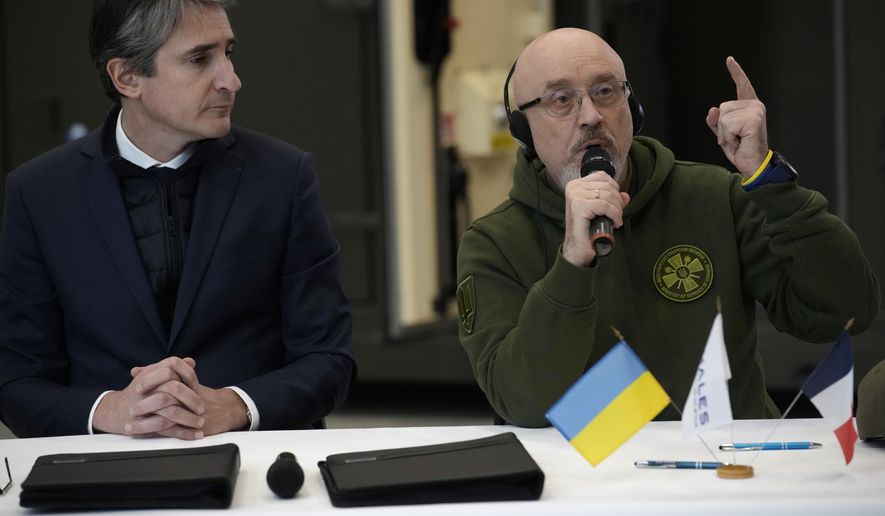Ukrainian Defense Minister Oleksii Reznikov has seen a lot in the year since Russian forces crossed over the border into his country — and very little of it has gone the way the experts predicted.
Russia, he told a video conference hosted by the Hudson Institute Tuesday, has thrown vast armies, armadas of tanks and every weapon short of its nuclear stockpile at its smaller neighbor, only to be denied a quick victory and has even been forced to cede some ground in the east and south that it long controlled.
Ukrainian forces, who repelled the first attacking columns with the Western-supplied small arms that underground guerrillas might use against an occupying army, now are operating sophisticated missile defense systems and high-tech long-range artillery, while preparing for even more lethal aid in the pipeline as they take the fight to the dug-in Russian forces.
“Now, our defenders are training on Patriot systems,” he noted. “We are expecting the arrival of the first tanks from Europe next week. We have received hundreds of artillery units and dozens of [multiple launch rocket systems], air defense systems, and huge quantities of other weapons.”
Like many in the administration of President Volodymyr Zelenskyy as the Feb. 24 one-year anniversary of the war looms, Mr. Reznikov noted the heavy skepticism of even Ukraine’s Western supporters that it could hold out long against its larger, better-armed neighbor.
“Many respected figures in the West believed that Kyiv would fall within three days followed by Ukraine’s defeat within a couple of weeks,” Mr. Reznikov said. “But the Ukrainian army, the Ukrainian government, and the Ukrainian nation have proven stronger than many expected.”
The surprising course of the fighting the past 12 months has transformed both the image and the character of Ukraine’s armed forces, Mr. Reznikov argued. Ukraine’s army has become a de facto NATO force, he said, achieving almost complete interoperability with the Western military alliance it hopes someday to join.
And the U.S. and its NATO allies are learning that the fight for Ukraine will have reverberations far beyond the region, he argued.
“The Kremlin is regularly attacking peaceful cities across Ukraine with missiles,” he said. “Poland, Moldova, and Romania are also under a direct missile threat.” Russian mines in the Black Sea, he said, also pose a direct threat to all ships sailing through that vital waterway.
The Ukrainian defense minister also faced head-on concerns that U.S. and European popular support for aiding Kyiv economically and militarily is weakening as the costs mount and Russian President Vladimir Putin appears set on a grinding war of attrition that could last years. After sending billions of dollars worth of security packages to Ukraine, Mr. Reznikov said he’s not surprised that some Americans are wary about continuing to underwrite a foreign war.
“Americans have experienced a certain fatigue. They’re asking why they should support Ukraine. That’s only natural,” he said. “But, despite what the Kremlin is trying to tell everyone, this is not a conflict between two Slavic countries. This is an existential conflict between the free world and the world without freedom.”
He argued that Mr. Putin’s territorial ambitions won’t be satisfied if Russia wins its war on Ukraine.
“Unless the enemy is defeated in Ukraine, the conflict will spread. The whole world is watching closely to see the consequences of this war,” he said. “If there is any indication that the tactic of armed aggression against a sovereign state works, military threats around the globe will increase.”
“We will fight for as long as it takes to win,” Ukrainian Ambassador Oksana Markarova told the Hudson Institute event. “We can win this war. I think that’s clear to everyone.”
• Mike Glenn can be reached at mglenn@washingtontimes.com.




Please read our comment policy before commenting.